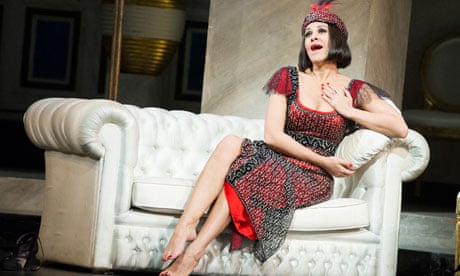It took the Royal Opera 85 years to get round to staging La Rondine, Puccini's slender, uncharacteristically introverted tale of youthful innocence pursued and lost. When it was first seen here in 2002, Nicolas Joel's production made up for the wait; revived now for the second time, it still looks fabulous. Designed by Ezio Frigerio and Franca Squarciapino, this is a grand, floor-to-ceiling evocation of decadent Paris replete with art-nouveau mosaic walls, louche gentlemen and effortlessly glamorous ladies, all dissolving into an Act III awash with Provencal sunlight, distilled through stained-glass vines.
The production was created around Angela Gheorghiu, and though she hasn't sung at every single performance, she still owns the role of Magda here. When she is on stage it is still hard to look anywhere else. And yet, as the worldly-wise courtesan determined to recapture the buzz of her youth, her performance adds to the opera's poignancy perhaps more than intended. Vocally, Gheorghiu now seems to be using her resources very carefully indeed. When she sings out, her creamy, steel-tipped tone remains glorious – her early aria, Chi il bel sogno di Doretta, is beautifully done. But there are also whole passages when she makes us strain to hear her - notably her Act I chatter with her three friends, very well sung by Dusica Bijelic, Hanna Hipp and Justina Gringyte, all members of the ROH's young singers' programme.
Around Gheorghiu's star revolves a cast that includes Charles Castronovo, singing solidly as her gauche lover Ruggero, Pietro Spagnoli as her protector Rambaldo, and Edgaras Montvidas, excellent as the effete Prunier. Soprano Sabina Puertolas makes a strong house debut as the maid Lisette, even if the humour of her role is rather bluntly drawn; otherwise, Stephen Barlow's revival direction is notably detailed and insightful. Under Marco Armiliato the orchestra has romantic sweep and fluidity but not especially refined tone, and there are one or two shaky moments. This revival is absolutely worth seeing. On balance, it's worth hearing too.
In rep until 21 July. Broadcast live on BP Big Screens on 11 July.

Comments (…)
Sign in or create your Guardian account to join the discussion